
The Bee Gees were a musical group formed in 1958 by brothers Barry, Robin, and Maurice Gibb. The trio were especially successful in popular music in the late 1960s and early 1970s, and later as prominent performers in the disco music era in the mid-to-late 1970s.

Sir Barry Alan Crompton Gibb is a British musician, singer, songwriter and record producer. Along with his younger twin brothers, Robin and Maurice, he rose to worldwide fame as a member of the Bee Gees, one of the most commercially successful groups in the history of popular music. Gibb is well known for his wide vocal range including a far-reaching high-pitched falsetto. Gibb's career has spanned over 60 years.

Cucumber Castle is the seventh studio album by the Bee Gees, released in April 1970. It was produced by Barry Gibb, Maurice Gibb, and Robert Stigwood. It consists of songs from their television special of the same name, which was named after a song on their 1967 album Bee Gees' 1st. Cucumber Castle is the only Bee Gees album not to feature any recorded contributions from Robin Gibb, as he had left the group before the album was recorded.

Trafalgar is a 1971 album by the Bee Gees. It was their ninth album, and was released in September 1971 in the US, and November 1971 in the UK. The album was a moderate hit in the United States, and peaked at No. 34. The lead single "How Can You Mend a Broken Heart?" was the first Bee Gees' No. 1 single in the United States but failed to chart in Britain as did the album. It is Geoff Bridgford's only full-length appearance on a Bee Gees album as an official member.
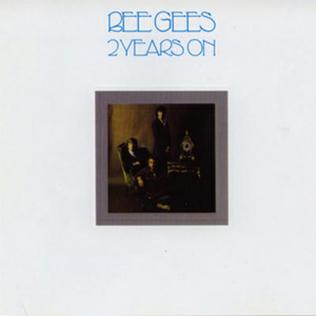
2 Years On is the eighth studio album by the Bee Gees, which reached No. 32 on the US charts. Released in 1970, the album saw the return of Robin Gibb to the group after an earlier disagreement and subsequent split following Odessa. 2 Years On was the first album with drummer Geoff Bridgford, who remained a full-time member of the group until 1972 although he was not pictured on the sleeve. The best-known track is "Lonely Days". Released as the first single by the reunited brothers, it charted high in the US, but peaked at No. 33 in the United Kingdom.

"How Can You Mend a Broken Heart" is a song released by the Bee Gees in 1971. It was written by Barry and Robin Gibb and was the first single on the group's 1971 album Trafalgar. It was their first US No. 1 single and also reached No. 1 in Cashbox magazine for two weeks.
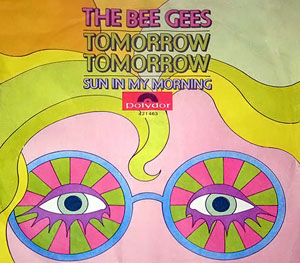
"Tomorrow Tomorrow" is a song by the Bee Gees written by Barry and Maurice Gibb. The song was originally intended to be recorded by Joe Cocker. It was the first Bee Gees single released after Robin Gibb had quit the group which was now down to a trio featuring Barry Gibb, Maurice Gibb, and drummer Colin Petersen.
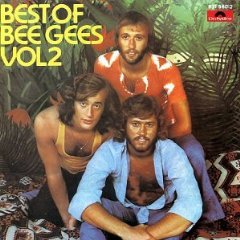
Best of Bee Gees Vol. 2 is a compilation album of hits by the Bee Gees released in 1973. The album, briefly revived on CD in the late 1980s, went out of print, but was reissued by Rhino in November 2008.

"Don't Wanna Live Inside Myself" is a ballad written and sung by Barry Gibb, and released on the Bee Gees' album Trafalgar in 1971, and the second single release taken from the album.

"My World" is a 1972 single released by the Bee Gees. It was originally released as a non-album single on 14 January 1972 worldwide. but was later included on the compilation Best of Bee Gees, Volume 2 in 1973. The flip side of the single was "On Time", a country rock number composed by Maurice Gibb. "My World" reached the Top 20 in both US and UK.

"Run to Me" is a song by the Bee Gees, the lead single from the group's album To Whom It May Concern (1972). The song reached the UK Top 10 and the US Top 20.
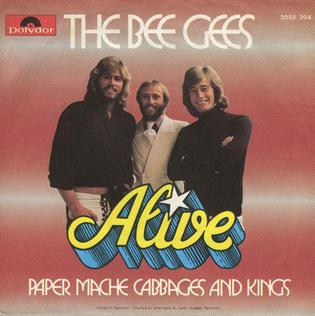
"Alive" is a ballad recorded by the Bee Gees for their album To Whom It May Concern. It was the second and last single from the album released on 10 November 1972 worldwide. The song was credited to Barry and Maurice Gibb and produced by the Gibbs and their manager Robert Stigwood.

One for All Tour is a concert video from The Bee Gees recorded live at the National Tennis Centre in Melbourne, Australia in November 1989. Melbourne was the third final stop on their 1989 One for All World Tour, which included the United States, Europe, and Asia the first time the Bee Gees played live there since their 1979 Spirits Having Flown Tour. Originally, this video was released in two volumes on VHS, each 50 minutes apiece. Volume One incorrectly listed the song "My World" from 1972 instead of the song "World" from 1967. In the DVD era, the cover was slightly changed and was released under the title The Very Best of The Bee Gees Live! in 1997.
"The Singer Sang His Song" is a song by the Bee Gees, written by Barry, Robin and released in early 1968 as a single along with Jumbo. In some countries the song was the B-side of Jumbo but in others they were promoted as a double A-side.
"On Time" is a song written by Maurice Gibb and recorded by the Bee Gees released on 14 January 1972 as the B-side of the single "My World".
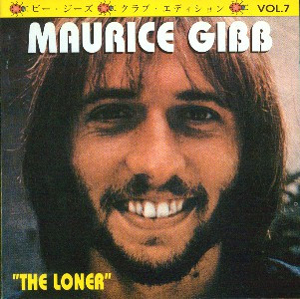
The Loner is an album recorded in late 1969 by Maurice Gibb of the Bee Gees. An album master was compiled on 14 November 1970, but to date The Loner remains unreleased. Bootleg releases with the same title collect additional recordings unrelated to this album.

"Country Woman" is a song written and released by British rock band Bee Gees. It was written and performed solely by Maurice Gibb, and released as a B-side of "How Can You Mend a Broken Heart", which was the group's first US No. 1. The songs were released as a double A-side in Germany, France, Japan and Canada.
"We Lost the Road" is a song by the Bee Gees, it was written by Barry Gibb and Robin Gibb and was released on their 1972 album To Whom It May Concern.

"Lamplight" is a song by the Bee Gees, released as the B-side of "First of May", but featured as the single's A-side in Germany. It also featured on their double album Odessa in March 1969. The song was written and composed by Barry, Robin & Maurice Gibb and featured lead vocals by Robin Gibb. No other singles were released from the album, and the fact that the group's manager Robert Stigwood chose "First of May", which only featured Barry Gibb's voice for the A-side, that caused Robin to quit the group.

"Israel" is a ballad track written by Barry Gibb. It appeared on the Bee Gees' 1971 album, Trafalgar.
















